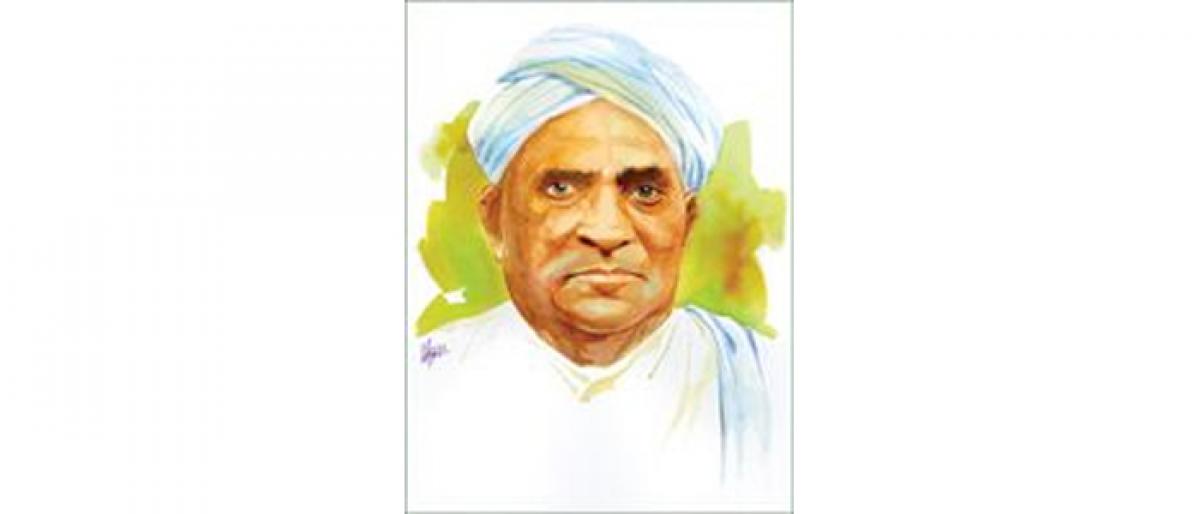The father of spoken language movement

August 29 is being celebrated as Telugu Language Day across the country by Telugus in memory of Gidugu Venkat Rama Murthy aka Gidugu Rama Murthy William Butler remark aptly represents Think likewise men but communicate in the language of the local people It validates the significance of Vyavaharika Bhashaspoken language in all areas
August 29 is being celebrated as “Telugu Language Day “across the country by Telugus in memory of Gidugu Venkat Rama Murthy aka Gidugu Rama Murthy. William Butler remark aptly represents “Think likewise men but communicate in the language of the local people”. It validates the significance of “Vyavaharika Bhasha”(spoken language) in all areas. Gidugu Rama Murthy was born on August 29,1863 in Parvatalapet of Srikakulam district of Andhra Pradesh. He was considered as the father of spoken language movement, social reformer, historian and an atheist. It is his 155th birth anniversary that emits the fragrance of shysta vyavaharika Telugu.
Owing to his father’s sudden demise he was compelled to live with his maternal uncle to complete education in Maharaja’s English Medium School and matriculated in 1879. He was classmate to Gurajada Apparao and joined as a history teacher in the same Maharaja's school to sail his family boat. Later he graduated privately and got chance to work as lecturer in Maharaja College of Vizianagaram. We are aware of that in this modern era too caste and untouchability are having their impact but at that time he made his valuable contributions to the “Savara” caste people.
It was a very praiseworthy effort by him because Savaras were considered as underprivileged. He learned Savara language to make them literates and allowed them to dine along with him. He wrote many books in that language and spent his own funds for the establishment of schools and for recruiting teachers for the flourishing of the Savara language. He wasappreciated from the Madras government which honoured him with “Rao Bahadur” title.
He wrote a functional grammar for “Savara “Language in English (1931) and prepared a dictionary for Savara –English in 1936. They were printed by Madras Government and Gidugu was honoured with “Kaiser-e-Hind”
Though, he had an immense authority on Sanskrit and in English, he fought for the elevation of “Vyavaharika Bhasha (spoken Language) instead of Grandhika Bhasha(written language).
He had faced a strange difficulty to understand historical inscriptions and learned Sanskrit to comprehend the same. This made him identify the difference between the spoken language and the language of inscriptions and decided to reduce the same with the help of a spoken language movement/syshta vyvaharika bhasha udyamam. He proved that it is not possible to convey all the ideas and thoughts of the writer in Grandhika Bhasha.
The difference of medium of instruction and spoken language was first identified by JA Yates in 1907 in the schools and the same was brought to the notice of Gidugu and Gurajada. This laid the foundation for the “Vyavaharika bhashodyamamu” (Spoken Language movement) forming a quartet of language intellectuals namely Gurajada, Srinivasa Iyyangar, and J.A, Yates. Gidugu strove very hard for the use of spoken language for academic purposes.
His cerebral industry from 1906 to 1940 was dedicated to proving the spoken language’s credibility for writing books and textbooks. He was well supported by Kandukuiri Vireshalingam Pantulu. He founded a monthly with the name “Telugu” for the dissemination of “Vyvaharika Bhashodyama” in between 1919-1920. His efforts were sent jitters in the backs of Grandhika Bhasha supporters of “Andhra Sahithya Parishad”. They intensely opposed his moves but he silenced them by citing the difficulties in understanding the Grandhika Bhasha in Tanuku meeting (1925).
To replace the Grandhika Bhasha of textbooks with spoken language Gidugu sacrificed his whole life and succeeded. The origin of “Vartamanandhra Bhasha Pravarthaka Samajam” with Kandukuri as the President and Gidugu as Secretary paid rich dividends to the Vyvaharika Bhashodyamamu. However, after noticing the growing disagreement towards the Grandhika Bhasha, the Andhra Sahithya Parishad officially announced that it had no objection to the use of spoken language in the classrooms and others. Till his last breath, he endeavoured for the wide utility of the spoken language.
Gidugu passed away on January ,22,1940. His explicit spirit towards spoken language shouldered and carried by his disciples such as Tapi Dharma Rao and Chilukuri Sambasiva Rao etc. For modern Telugu poets, now it has become a trend to write in the spoken language in Telugu. Here, I will quote Nelson Mandela on the significance of people language or spoken language. He said: “If you talk to a man in a language he understands that goes to his head, if you talk to him in his language that goes to his heart”.
After his death it was decided to commemorate his birthday as “Telugu Language Day” on every August 29. He was respectfully called as “Pidugu” for his efficacy in the defence of spoken language over written language. But, mere felicitation and posthumous garlanding of “Gidugu” photo should not be a real tribute except strengthening of Telugu usage in spoken language.
E Gajendra Nath Reddy

